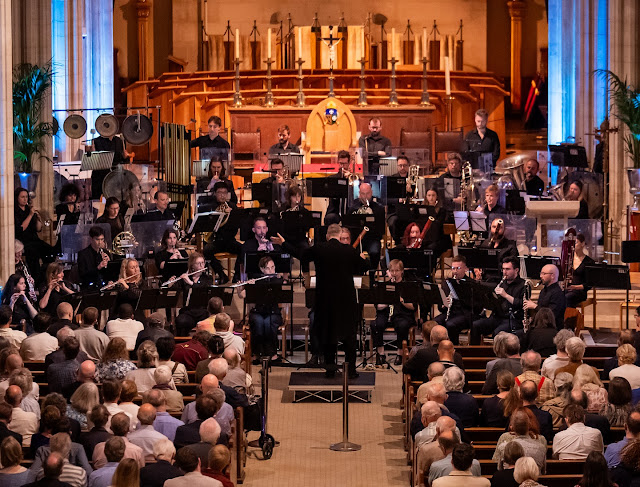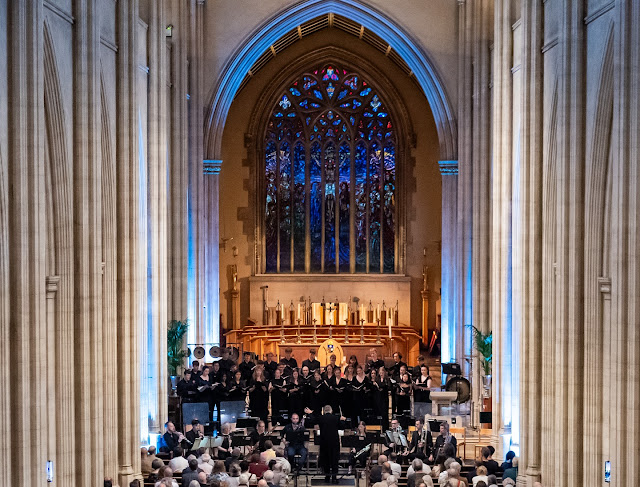 |
| Messiaen: Et exspecto resurrectionem mortuorum – Britten Sinfonia, Sinfonia Smith Square, Nicholas Daniel – St George’s Cathedral, Southwark (Photo: Britten Sinfonia) |
Stravinsky: Symphonies of wind instruments; Poulenc: Timor et tremor, Vinea mea electa, Tristis est anima mea; Duruflé: Ubi caritas et amor; Stravinsky: Mass; Messiaen: Vocalise-etude, O sacrum convivium, Et exspecto resurrectionem mortuorum. Choir of Merton College, Oxford, cond. Benjamin Nicholas; Britten Sinfonia, Sinfonia Smith Square, cond. Nicholas Daniel; St George’s Roman Catholic Cathedral, Southwark, London
Reviewed by Tony Cooper, 30 April 2025
This concert marked Nicholas Daniel’s final performance with the Britten Sinfonia as principal oboist, a post he has held since being one of the founding members of the orchestra in 1992.
I think it’s fair to say that this concert featuring a performance of Olivier Messiaen’s monumental work Et exspecto resurrectionem mortuorum performed by the Britten Sinfonia, and Sinfonia Smith Square with music by Poulenc, Duruflé and Stravinsky with the Choir of Merton College, Oxford, could well be described as a ‘once-in-a-decade’ musical experience.
For sure, a tremendous piece, Et exspecto is rarely performed nowadays because of the sheer scale of the musical forces required such as the huge sections of wind and brass (no strings) needed alongside an extraordinary range of percussion and ‘knocking’ instruments comprising three sets of cowbells, three tam-tams and six tuned gongs were part of the hardware as well as a set of tubular bells all safely in the strong and skilful hands of half-a-dozen percussionists aka the ‘Heavy Metal Boys’.
Commissioned by the French Minister of Cultural Affairs, André Malraux, to honour the Fallen of the First and Second World Wars, Messiaen conceived the work to be performed in large spaces such as churches and cathedrals and, indeed, in open-air performances. He found inspiration in writing the piece by the countryside of the Hautes-Alpes (a department in the Provence-Alpes-Côte d’Azur region of south-eastern France) and by the imposing images of Gothic and Romanesque churches.
‘I feel that Et exspecto presents a rare opportunity for an unforgettable musical journey for audience and performers alike,’ enthused Nicholas Daniel, who conducted the work while marking his final performance with the Britten Sinfonia as principal oboist, a post he has held since being one of the founding members of the orchestra in 1992.
He further added: ‘The unique soundscape is immense and powerful and bringing Et exspecto to life in the stunning surroundings of Augustus Pugin’s St George’s Cathedral, Southwark, beautifully designed in the Gothic style, is a lifetime’s ambition for me. I’m tremendously excited to share this experience with some of the great musicians in the UK including the exceptional and gifted young artists of Sinfonia Smith Square.’
Opening the concert fell to Stravinsky’s ritualistic Symphonies d’instruments à vent (Symphonies of wind instruments) dedicated to the memory of Debussy who died in 1918. A one-movement, nine-minute work dating from 1920, the première took place in London on 10 June 1921 conducted by Serge Koussevitzky. A fulfilling and entertaining work all round the woodwind and brass of Britten Sinfonia and Sinfonia Smith Square were found to be on tremendously good form.
The evening’s programme also brought together music exploring themes of reflection, loss and hope featuring the Choir of Merton College, Oxford, conducted by Benjamin Nicholas, a musician steeped in the English choral tradition as he was a long-serving member of Norwich Cathedral Choir where his father, Michael Nicholas, held the post of Master of Music for a great many years. Choir director of Merton since 2008, Mr Nicholas (who’s also principal conductor of the Oxford Bach Choir) became the first full-time organist and director of music at Merton in 2012.
Without doubt, Merton’s performance of Poulenc’s Quatre motets pour un temps de pénitence (Four penitential motets) written in 1938-39 to Latin texts proved a highlight of the programme overall. Regrettably, only three of the pieces were performed.
However, the text for the first motet, Timor et tremor (Great fear and trembling) combines verses from psalms 54 and 30 which Orlando de Lassus also set as a motet. The other two were based on responsories for Holy Week: Vinea mea electa (Vine that I loved as my own), a responsory for the matins on Good Friday and Tristis est anima mea (Sad is my soul and sorrowful), the second responsory of the Tenebrae service of Maundy Thursday depicting Christ’s Agony in the Garden of Gethsemane proved a devotional, thoughtful and delicate piece,
Without doubt, Merton excelled in their performance tightly controlled by Benjamin Nicholas that was simply inspiring and joyous to hear in the elegant surroundings of Pugin’s Gothic masterpiece while the choir dug deep and found gravitas and understanding in delivering an excellent account of Duruflé’s Ubi caritas et amor, Deus ibi est (Where true charity and love dwell, God himself is there) written in 1960.
Of only two minutes in length, the motet’s based on an ancient chant of the same name that may have originated with the so-called Gallican rite, the liturgical tradition used in the churches of Gaul before Gregorian chant was implemented by the Frankish sovereign, Pepin the Short, in the middle of the eighth century.
Closing the first half of the programme, Stravinsky was back on the bill and so were, too, Merton (full on!) delivering a bright and intelligent reading of the Mass, a setting of the Latin Mass that Stravinsky wrote between 1944 and 1945, scored for an ensemble of wind instruments comprising two oboes, English horn (cor anglais), two bassoons, two trumpets and three trombones.
Representing one of only a handful of extant pieces by Stravinsky that was not commissioned, Robert Craft, who worked closely with the composer, is quoted as saying that he wrote it out of a ‘spiritual necessity’. Conducted by the ‘man-of-the moment’, Nicholas Daniel, who achieved a good balance between the choral and instrumental forces, the work found great favour with the audience in what proved a thoroughly enjoyable performance not least by Stravinsky’s exciting writing for the ‘Sanctus’ which found brass, woodwind and the choral forces in fighting mood fully concentrated delivering a riveting performance.
Although Stravinsky abandoned the Russian Orthodox Church in his teens he was reconnected to his faith by attending a service at the basilica of Saint Anthony of Padua in the mid-1920s which inspired him to write his first religious composition, Pater Noster, for an a cappella choir. How I would dearly love to hear Merton perform it.
 |
| Stravinsky: Mass – Choir of Merton College, Britten Sinfonia, Nicholas Daniel – St George’s Cathedral, Southwark (Photo: Britten Sinfonia) |
The second half of this delightful, fulfilling and thoughtful programme, however, featured the music of Olivier Messiaen opening with the charming three-minute piece, Vocalise-etude, written in 1935 when Messiaen was 27 which offered a lovely oboe part played to exacting standards by Nicholas Daniel.
And surprising a packed nave, Merton reassembled at the back of the church in a semicircle format gathered closely to their conductor, Benjamin Nicholas, to sing O sacrum convivium (O sacred banquet) in which Christ is received, the memorial of his Passion is renewed, the soul is filled with grace and a pledge of future glory is given to all of us. A short, tender and truly loving piece of just four minutes, Merton’s rendition was delicate, sensitive and contemplative inspiring my Christian beliefs.
The final work in a wide and varied programme fell to Et exspecto resurrectionem mortuorum whose title punctuates the end of the fourth-century Nicene Creed ‘And I await the resurrection of the dead’ premièred in a private performance on 7 May 1965 in the grand and imposing Gothic setting of La Sainte-Chapelle, Paris, graced by President Charles de Gaulle and the great and the good! The work’s first public performance, however, took place just over a month later (20 June) in the Cathedral of Notre-Dame de Chartres under the direction of Serge Baudo.
The opening bars reflect the despair and hope found in Psalm 130 (‘Out of the depths have I cried unto thee’) followed by ‘Christ, risen from the dead, no longer dies’ thereby celebrating Christ’s victory over death through the majesty and mystery of the Resurrection. The next two movements ‘The time shall come when the dead hear the voice of the Son of God’ and ‘They shall rise again in glory, with a new name’ foretell the resurrection of the dead while the final movement ‘And I heard the sound of a great crowd’ (Revelations 19:6) portrays in a massive explosion of orchestral sound (American big band leader, Stan Kenton, would have certainly approved!) a grand vision of the praise and rejoicing of the resurrected in heaven.
A devout Catholic, as, too, were Poulenc and Duruflé, Messiaen was not only a church organist (he spent 61 years as organist of Église de la Sainte Trinité in Paris) and lectured at the Conservatoire de Paris while being a keen ornithologist. His music, therefore, replicates ‘birdsong’ through many of his works as employed in El exspecto thus symbolizing the harmony of the Natural Order with that of Divine Law equating to God the Father, the Supreme Being, the ultimate creator, ruler and preserver of all things.
Performed in such a beautiful and adorable setting as St George’s Cathedral, Southwark, the rarity of this work, I feel, will long be remembered by members of the audience and performers alike especially to those vibrant and gifted students of the Choir of Merton College who done Oxford University proud!
Tony Cooper
The blog is free, but I’d be delighted if you were to show your appreciation by buying me a coffee.
Elsewhere on this blog
- The sheer joy of performing together: Music in Secondary Schools Trust’s 12th Annual Concert – concert review
- Making connections between styles & eras: violinist Holly Harman & friends launch their album Ground – concert review
- Something of a revelation: forgotten songs by Robert Gund & William Grosz from Christian Immler & Helmut Deutsch – record review
- A genre finding its way: Maurice Greene’s Jephtha reveals different English oratorio before Handel consolidate the form – record review
- More than novelty value: at Conway Hall, the Zoffany Ensemble explores substantial 19th century French works for nine instruments – concert review
- Creating a fun day out as well as broadening the mind: Jack Bazalgette on his first Cheltenham Music Festival as artistic director – interview
- From RVW’s Sancta Civitas & Bliss’ The Beatitudes to Reich’s The Desert Music & Birtwistle’s Earth Dances, plus 19 premieres: the BBC Proms 2025
- Fierce virtuosity & sheer delight: oboist
Olivier Stankiewicz, soprano Lucy Crowe, violinist Maria Włoszczowska
& friends in a captivating evening of Bach, Zelenka, Handel, Vivaldi
– concert review - Dramatic engagement: Francesco Corti directs Bach’s St John Passion with the English Concert at Wigmore Hall on Good Friday – concert review
- Searching for possibilities: composer Noah Max on his four string quartets recently recorded by the Tippett Quartet on Toccata Classics – interview
- Home






%20Craig%20Fuller.jpg?w=160&resize=160,160&ssl=1)



